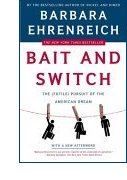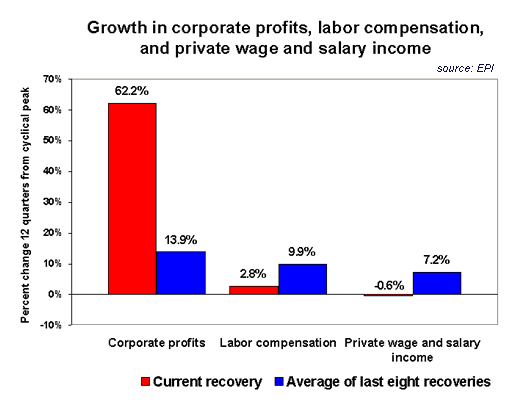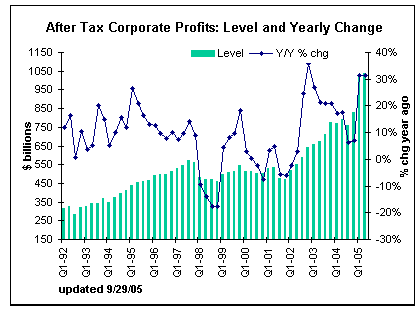

|
| weblog/wEssays archives | home | |
|
The Rot at the Corporate Center (September 22, 2006)  Just as Ms. Ehrenreich gained first-hand experience of low-wage services jobs in America by seeking employment in that sector, as recounted in her book Nickel and Dimed: On (Not) Getting By in America Given her education and experience, and the fact that she devoted herself entirely to the job search, she had every expectation of landing a job in a few months. The results were not what she expected. The book documents her complete failure, and that of the other unemployed white-collar types who she spent months networking with in an endless string of "executive" seminars, "networking" mixers, church "networking" functions, etc. Not one of her wide circle of contacts scored a job equivalent to the one which they'd lost. The net result, Ehrenreich concludes, is that as Corporate America downsizes--partly due to the extreme pressures ccreated by rising medical costs for their employees--the millions of people off-loaded at the unemployment office end up taking low-wage jobs in the service sector or taking a chance on starting their own businesses. She believes one of the fixes is--no surprise here for readers of this blog--a national healthcare plan which relieves companies from the burden of paying the ever-spiraling skyward costs of employees' healthcare. OK, cue the chorus of "sour grapes;" everyone she met in six months was a loser, right? It's their own fault, etc. Believe that old-time religion if you want, but you might want to read the book before forming an opinion. Consider this factoid quoted in the book's afterword: New research suggests that 17 percent of jobs that do not require a college degree are currently filled by college graduates, for a total of about seven million under-employed people. According to the Bureau of Labor Statistics, of the 25 fastest growing jobs for 2006, only five required a college degree at all. 
Meanwhile, corporate profits have reached postwar highs both in real dollars and as a percentage of GDP: When do workers get their share? by the Economic Policy Institute: Most of this growth in total labor compensation has been accounted for by rising non-wage payments, like health care and pension benefits. Rapidly rising health care costs and pension funding requirements imply that these higher benefit payments are not translating into increased living standards for workers, but are rather just covering the higher costs of health care and pension funding. Growth in total wage and salary income, the primary source of take-home pay for workers, has actually been negative for private-sector workers: -0.6%, versus the 7.2% gain that is the average increase in private wage and salary income at this point in a recovery.Forget Mideast: Profits Are the Problem (from the Wall Street Journal) Standard & Poor's also expects earnings to continue growing at a double-digit pace in the second half of the year. If those forecasts hold, it would make for the longest stretch of double-digit earnings gains since 1950, surpassing a long string of gains in the early 1990s.From 2001 to the fourth quarter of 2005, corporate profits as a percentage of United States G.D.P. rose significantly, to 11.6 percent from about 7 percent (New York Times)  Notes on the Latest Federal Budget Estimates:
Notes on the Latest Federal Budget Estimates:
In the first quarter of calendar 2006, corporate profits hit a post World War II high of 12.7 percent of the GDP. The administration projects that profits will be 12.2 percent of GDP for the full year.I would also like to share a more personal report from reader Steve S. who recently sent in the following comments in response to a chart I'd posted here which showed that only 20% of Americans 60 and older were working. Steve highlighted some possible reasons for this low number, and I want to reprint his comments in light of the above data points on corporate profits: My wife and I have been fiscally conservative, but politically, environmentally, educationally ... liberal. I see absolutely no conflict. Environmental health, challenging and open minds, Culture, our children's interest in life, etc. are important. Driving a BMW or SUV, living in a McMansion, eating out every night at a chain restaurant, dressing in GAP, Old Navy, etc. do not add anything to the appreciation of what was the variety of the world. We have both recently quit our jobs. We are part of your statistics - older people not working past 60. We ARE NOT living off HEW. (Federal Dept. of Health Education and Welfare, now known as the Department of Health and Human Services--HHS).Well-said, Steve. Thank you for your account of your own experience, and how these conditions may be fueling the exodus of 60-and-over workers. For more on this subject and a wide array of other topics, please visit my weblog. copyright © 2006 Charles Hugh Smith. All rights reserved in all media. I would be honored if you linked this wEssay to your site, or printed a copy for your own use. |
||
| weblog/wEssays | home |